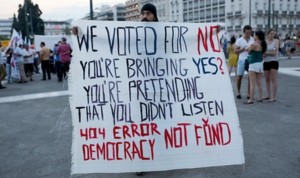As elections approach in Spain, the latest episode from our forthcoming documentary Money Puzzles.
[vimeo]http://vimeo.com/146373683[/vimeo]
In Greece last July our camera witnessed the tangible forms of solidarity elicited by the extreme austerity imposed by the unrelenting finance ministers in Brussels. ‘Solidarity For All’ is the name of an association of more than 350 solidarity groups across the country helping to feed people, provide health care, and other kinds of services they can no longer afford and whose public provision has been severely cut by austerity measures. But this is not just a stopgap. In Mandra, on the outskirts of Athens, where we filmed a food distribution centre, a local organiser explained that they’ve developed relations with local producers that cut out the middleman, and this was the kernel of a different way of organising society. Something similar is true of the widespread networks of local solidarity groups across Spain, each concerned with particular issues like protection from eviction or running food banks, but activists are never far away from the idea of alternative forms of social organisation, according to different values where money no longer determines what ‘value’ means, and people escape the atomisation and social isolation, with its dire psychological effects, that capitalism in crisis imposes to an ever more intense degree.
One of the reasons for the Eurogroup’s intransigence was the fear that what started in Greece might spread elsewhere in Europe. Syriza seemed to offer the hope that it was possible to overcome the fractured state of the left to create a irresistible new political force. The result of the Referendum last July, when over 61% of voters said No to the bailout conditions, seemed to confirm it. If the effort immediately collapsed when Alexis Tsipras lost his nerve and capitulated to Europe (a moment we documented in Greece, Europe, Undemocracy), then the latest developments in Portugal (Portugal gets new leftwing PM after election winner only lasted 11 days) suggest this dream has not been killed off, even if it implies compromises. In Spain–where I went to film at the beginning of November–there are elections coming up on December 20, but here the left is still fractured, and electoral politics are complicated by the emergence of a populist right wing party, Ciudadanos, in response to the sudden rise of Podemos on the left, who also face a challenge from other left groupings like Izquierda Unida. The primary political issue, however, during my fortnight in Barcelona and Madrid, was Cataluña’s bid for independence, with its unresolvable political and economic conundrums, rather different from the issues in the Scottish case. The issue plays into the hands of the constitutionalist majority, and no-one I spoke to thought that the left could win the elections.
The elections come up obliquely in this short video, Neighbourhood Solidarity in Madrid, filmed in Puerta Del Angel, just across the river from the city centre, with the local branch of the RSP (Red de Solidaridad Popular, or Network of Popular Solidarity) covering the districts of Latina and Carabanchel. The group’s primary activity is a food bank, but they also support people–that’s to say, each other–in other ways, and there are volunteers who provide professional advice or give classes in maths or languages.
The RSP Latina Carabanchel exemplifies the strength of the movement against austerity known as 15M, from the date of the mass demonstrations of the indignados in cities across the country (15 May 2011). The movement has generated a wide set of local initiatives attacking the effects of austerity politics in parallel fields, loose federations of autonomous local groups under umbrella names that indicate their focus. Thanks to a small network of friends active in one or other of these groups, I was able to connect with people working on housing, food provision, and healthcare in Barcelona and Madrid. These sequences will be included in the completed film. My thanks especially to Ricard Mamblona in Barcelona, and Concha Mateos in Madrid, who were both extremely generous with their time and attention as production managers, and to the camera people they found to work with me, Oriol Bosch Castellet and Raquel Salillas.


 Since getting back from Athens, we’ve been hard at work editing the next episode of ‘
Since getting back from Athens, we’ve been hard at work editing the next episode of ‘